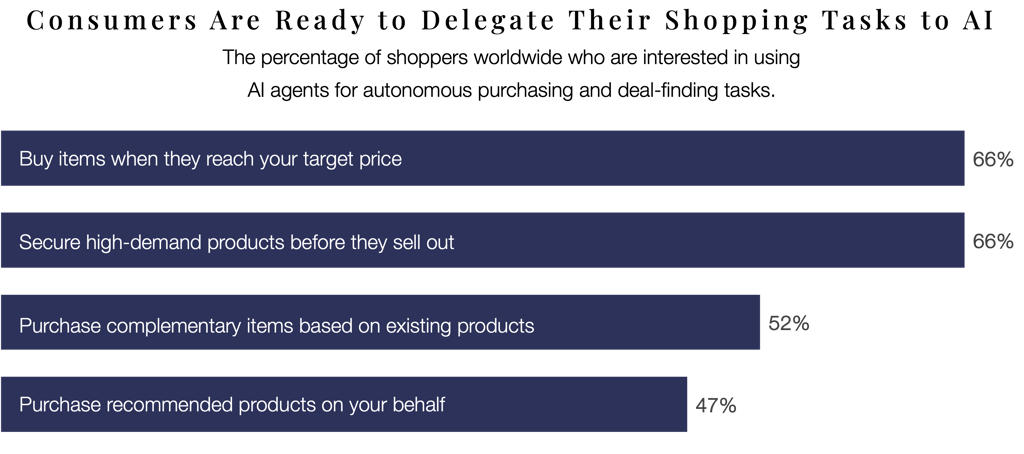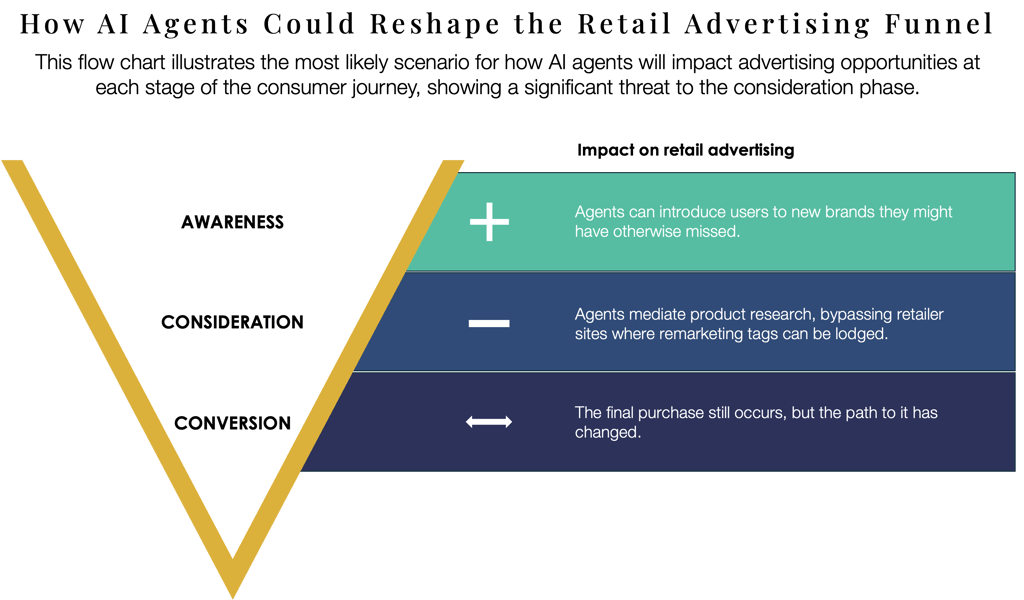The Agentic Shopping Experience: Are AI Agents for Shopping a Threat to Retail?
Explore how AI agents for shopping are revolutionizing ecommerce, threatening traditional retail traffic, ad revenue, and the entire customer journey. Learn how your business can prepare.
AI IN RETAIL AND ECOMMERCE
Garret Farmer-Brent
8/12/2025


For the past decade, the goal of every retailer has been to "own the customer journey." They've invested billions in sophisticated apps, personalized websites, and powerful retail media networks, all designed to attract customers and keep them within a carefully controlled digital ecosystem.
That entire ecosystem is now under threat.
A new, more powerful form of artificial intelligence is emerging, and it promises to fundamentally change how consumers discover, research, and purchase products. These are not the chatbots and virtual assistants we know today. This is the dawn of AI agents for shopping—autonomous, proactive entities that can execute complex tasks on a user's behalf.
This "agentic revolution" represents a potential extinction-level event for traditional retail business models that rely on website traffic and ad revenue. For business owners, the question is no longer if this will happen, but how to adapt when it does.
What Are AI Agents and Why Are They Different?
Unlike a chatbot that responds to your queries, an AI agent acts on your intent. A user could give an agent a simple command like, "Find me the best-rated waterproof running shoes for under £150 and buy them in a size 9."
The agent would then independently:
Research top-rated shoes across multiple review sites.
Scour the web for the best price from various retailers.
Access the user's stored payment and shipping information.
Complete the purchase.
The entire process happens without the user ever visiting a retailer's website. This shift from user-led discovery to agent-led execution is the core of the disruption. And while it may sound futuristic, consumer interest in handing over these tasks to AI is already remarkably high.


Source: SalesForce
Is your retail business ready for the next upgrade to you technology mix – but you don't know where to start?
The Billion-Dollar Threat: Traffic, Ad Revenue, and Disintermediation
When a customer uses Google, the search engine gets ad revenue. When they visit Amazon, the retail giant gets traffic, customer data, and the opportunity to serve high-margin ads through its retail media network.
AI agents for shopping threaten to sever this direct link. If the agent becomes the new front door to commerce, it intercepts the customer at the top of the funnel. This creates several critical threats for retailers:
Loss of Web Traffic: The most immediate impact. If the agent shops on the user's behalf, the retailer's site or app may never be visited, causing a catastrophic drop in traffic.
Collapse of Ad Revenue: Retail media is a multi-billion dollar industry built on monetizing site traffic. No traffic means no ad impressions, gutting a crucial and high-profit revenue stream.
Disintermediation: Retailers risk being relegated to mere fulfillment centers. The agent, not the retailer, owns the customer relationship, the data, and the influence.
This isn't a distant threat. Major retailers like Amazon are already reportedly implementing "guardrails" and updating legal policies to control how AI agents can interact with their sites, a clear sign they see the danger ahead.


Source: EMARKETER
The Retailer's Gambit: Adapt or Be Disintermediated
Ignoring the rise of AI agents for shopping is not an option. The path forward requires a strategic, proactive approach. Retailers have three primary paths to consider:
Build Your Own Agent: The most defensive strategy. Create a proprietary AI agent that is so effective and integrated into your ecosystem (e.g., loyalty programs, inventory) that customers choose to use it over third-party options.
Forge Strategic Partnerships: If you can't beat them, join them. Work directly with AI developers like OpenAI or Perplexity to ensure your products are favorably represented and that a data/revenue-sharing model is in place.
Become Agent-Optimized: Just as businesses optimized for search engines (SEO), they will need to optimize for AI agents (AIO). This means structuring product data, APIs, and content in a way that is easily digestible and prioritized by these new gatekeepers.
The Revolution Will Not Be Browsed
The shift from a browser-led to an agent-led internet is one of the most profound changes in the history of digital commerce. It challenges the very foundation of how retailers have built their online businesses for the past two decades.
The work to adapt must begin now. Business owners need to invest in strengthening their first-party data, experimenting with AI, and developing a clear strategy for how they will engage in a world where their next customer might not be a person, but a highly intelligent agent acting on their behalf.
Begin your AI business upgrade today by taking our comprehensive AI Readiness Assessment.
You'll receive a full business analysis report at no charge.




